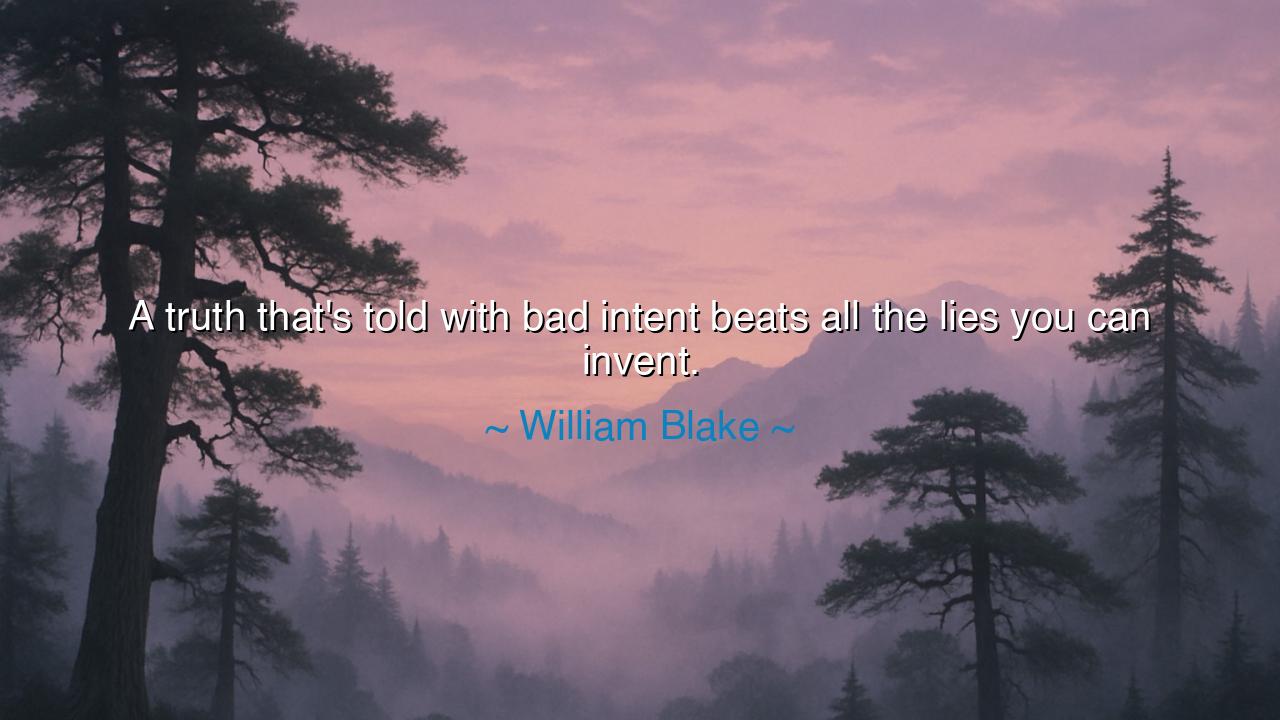
A truth that's told with bad intent beats all the lies you can






Hear the fiery words of William Blake, prophet-poet of vision and thunder: “A truth that’s told with bad intent beats all the lies you can invent.” In this utterance, Blake unveils the dark paradox of truth itself—that it is not only what is spoken, but how and why it is spoken that gives it its true weight. For even truth, the most sacred of treasures, can be wielded as a weapon, sharper than lies, more destructive than falsehood, when it is told with malice, vengeance, or cruelty. Lies may deceive, but a poisoned truth pierces the heart more deeply, for it carries with it the sting of reality itself.
The meaning is stark: lies are fragile fabrications, easily unraveled in time. They distort reality, but they lack its foundation. Yet a truth spoken with bad intent cannot be dismissed, for it has reality behind it. Even when used to harm, it wounds with undeniable force. Thus Blake warns us that truth itself is not pure simply because it is true; its power depends on the spirit in which it is uttered. To tell truth without love, without compassion, without purpose toward the good, is to unleash something crueler than falsehood.
The ancients knew this danger. Consider the tale of Diogenes the Cynic, who roamed Athens proclaiming the hypocrisy of men. His words were often truths, yet he wielded them with mockery, humiliating rather than uplifting. Though he sought to awaken, at times his barbed truths cut deeper than lies, earning him hatred. His story reminds us that truth can enlighten, but also destroy, depending on intent. As the proverb says: “A word fitly spoken is like apples of gold.” But a truth spoken with venom is like an arrow tipped with fire.
History, too, provides witness. During the French Revolution, many truths were proclaimed about the corruption of monarchy and nobility. Yet these truths, wielded with bad intent and thirst for vengeance, fed the Reign of Terror. Heads rolled, not always in justice, but in frenzy, as truth became a blade rather than a light. Lies could not have wrought such destruction; it was truth itself, twisted by hatred, that unleashed the storm. Blake’s words echo here with prophetic force.
Even in our daily lives, we see this law at work. To tell a man of his weakness, not to help him, but to shame him, is to wound more deeply than a lie ever could. To reveal a painful truth out of spite is to betray the very essence of truth, turning it into cruelty. This is why Blake proclaims that one such act “beats all the lies you can invent”—for while lies may cloud the mind, a malicious truth scorches the soul.
The lesson, then, is urgent and eternal: guard not only the words you speak, but the intent that drives them. Truth is sacred; it must be wielded with reverence, not with malice. To use truth to harm is to profane it, to turn a gift of heaven into a weapon of destruction. Lies may be cast aside in time, but a cruel truth may leave scars that endure forever.
Practical is this path: when you must speak truth, search your heart first. Ask—do I speak to heal, to guide, to enlighten, or do I speak to injure, to mock, to dominate? If your intent is impure, silence may be wiser than speech. Speak truth always with compassion, for then it will become a balm, a light, a bridge. For as Blake teaches, truth with bad intent is worse than lies—but truth spoken with love is the highest gift one soul can give to another.






TNNguyen Trong Nguyen
Blake’s quote is a powerful reminder that truth can be just as damaging as a lie, depending on how it’s used. It raises the question of whether we are responsible for the consequences of the truths we tell. If we are aware that our truth could hurt someone, should we hold back, or is it our duty to speak up, regardless of the impact? How do we handle the responsibility of speaking the truth?
FNFox Neko
Blake’s statement made me think about how important both truth and intent are in communication. It’s one thing to tell the truth, but if it’s done with malice or bitterness, does it truly serve any purpose? Can truth really heal when it’s delivered with bad intent? Is it possible to reconcile honesty with kindness, or must we sometimes choose between them?
Lleminhtien
This quote from Blake highlights the power of intent when it comes to truth. I wonder, how often do we tell the truth with harmful intentions, maybe without even realizing it? Could it be that we sometimes use truth as a way to hurt others or make ourselves feel superior? Is there a way to speak the truth in a way that is both honest and empathetic?
HTNguyen ha trang
Blake’s quote makes me reflect on how the intention behind truth-telling can change its impact. It’s fascinating to think that a truth told with bad intent might be more harmful than any lie. Does this mean that honesty, when wielded carelessly, can hurt more than deceit? How do we navigate the delicate balance between being truthful and being kind? Is it possible for truth to be used as a weapon?